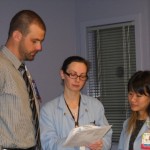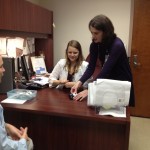I am an eternal optimist, and today, I’d like to talk about two concepts which have optimism at their heart. First, the value of setting a goal and pursuing it relentlessly, and, second, the importance of being the “MVP,” or most valuable pharmacist, on the health care team.
Baseball, America’s pasttime, has always been a big part of my family’s life. Our sons played everything from T-ball to Babe Ruth. I am a Cubs fanatic, as well. If you know anything about baseball, you know that makes me the eternal optimist!
In preparing for today, it occurred to me that the baseball metaphor was perfect. We all need to be most valuable pharmacists, or MVPs, on our respective health care teams. We need to be MVPs because our patients need us more than ever. The numbers bear this out.
Over the last decade, we have seen a rise in preventable adverse drug events. One study of 400 patients at an academic medical center found that close to 20 percent had adverse events after discharge. Of these, adverse drug events were the most common type … at 66 percent. And of those, nearly half were preventable, and many could have been avoided with simple medication therapy management strategies.[1]
So what are we missing here?
I believe we are in need of a new level of intensity for how we approach our jobs, how we see patients and patient care, and how we exercise our power to change things for the better. We, as pharmacists, must step up to the plate, embrace change, and become accountable for the care we provide. We must become Most Valuable Pharmacists.
Up To Bat: Traits of an MVP
If we are going to change patient care for the better, we all must become MVPs on our respective teams. But how? Clearly, becoming an MVP is not an easy process. It takes years, a complete devotion to your “sport,” loyalty to the team, and a number of personal and professional traits that I’d like to share with you.
The first of these traits is that MVPs have a winning mindset. They own both their successes and their failures. MVPs see failure as a “lesson learned,” building on the knowledge of what went wrong to make improvements. In that way, MVPs are both optimists and realists.
MVPs have an ability to change up the plays. They continually look for innovative ways to contribute to the team. What can you do today to adapt to your changing workplace?
MVPs continue to work on their skills and knowledge of the “game.”
MVPs are good sports. When my sons were small, this was one of the hardest things to teach them… to be positive and supportive of the opposing team even if you fail to win. If we are “good sports” as Most Valuable Pharmacists, we know that we will have some setbacks. But we will keep focused on what’s important—our patients.
MVPs keep their cool. As a society, we don’t typically admire athletes who throw tantrums. We instead look up to the players who remain calm under pressure. But this doesn’t mean you shouldn’t be passionate about what you do. It does mean that you should strive to maintain your balance when you get thrown a curve ball.
MVPs take care of their team. They motivate fellow team members, inspiring others to take action.
Finally, MVPs know how important fans are to the game. We must make fans out of our patients and their families. We also must make fans out of fellow health care providers and the C-suite. We can’t take for granted that administrators know who we are, what we do, and the value that we bring to the team.
Finally, we must make fans out of legislators and regulators, because they influence pharmacists’ scope of practice.
“Put Me in, Coach…. I’m Ready to Play!”
I’ve laid out a case for the importance of becoming the Most Valuable Pharmacist within your institution. Now, how will you become an MVP? Here are six specific suggestions to help you on your path to MVP:
- First, ask for duties outside of your comfort zone. Every pharmacist at Bethesda is a registered preceptor. This was a big step for some, but they all play a part in educating our future practitioners – and they do a great job.
- Track your interventions to see how you are improving patient care. Share this information with your administrative team to demonstrate that pharmacists make a difference every day.
- Continually develop and refine your capabilities and skills. Practitioners, seek more education in an area that you really love or where you need to strengthen your skills.
- Build and manage your team. ASHP’s vision is that by the year 2020, all new pharmacists providing direct patient care will have completed an accredited residency.
- Seek leadership opportunities within your practice setting, with your state affiliate, and with organizations like ASHP. There is no better way to expand your horizons than to network with others.
- Embrace practice model change. No matter what your job is and no matter what the size of your hospital, there is so much we can all do to determine where our practice gaps are and to begin to close them.
I challenge each of you to step up to the plate for better patient care. Remember that MVPs have a winning mindset. They are optimistic in the face of difficult odds and work hard to make sure that they have the skills and knowledge to make the best plays at the right time. MVPs care passionately about what they do. And they understand that fans are always watching and rooting for their success. It isn’t easy, but it’s a highly rewarding role to play.
[1] The Incidence and Severity of Adverse Events Affecting Patients after Discharge from the Hospital, Ann Intern Med 2003;138:161-167Alan J. Forster, MD, FRCPC, MSc; Harvey J. Murff, MD; Josh F. Peterson, MD; Tejal K. Gandhi, MD, MPH; and David W. Bates, MD, MSc









 If you want to contribute tutorials, news or other stuff please contact us. We pay 150 for each approved article.
If you want to contribute tutorials, news or other stuff please contact us. We pay 150 for each approved article. Consectetur adipisicing elit. Sed do eiusmod tempor incididunt ut labore.
Consectetur adipisicing elit. Sed do eiusmod tempor incididunt ut labore. This site uses valid HTML and CSS. All content Copyright © 2010 Newscast, Inc
This site uses valid HTML and CSS. All content Copyright © 2010 Newscast, Inc If you like what we do, please don't hestitate and subscribe to our
If you like what we do, please don't hestitate and subscribe to our